#Chinese diaspora
Text
Hey MDZS fandom. I want you guys to be careful interacting with this person.

If you don't already know, Chinese people have had a long history with cultural erasure when it comes to taking on English-language names. It started with imperialism, and continues as a way to "assimilate" and avoid mockery of our language in western countries.
For Chinese diaspora like myself, it's another form of racism we face, to the point where some of us are reclaiming our names in everyday life. Here's an article about this movement happening across Asian diasporas in the United States -- just to name one instance out of many.
The responses to this post reflect that:
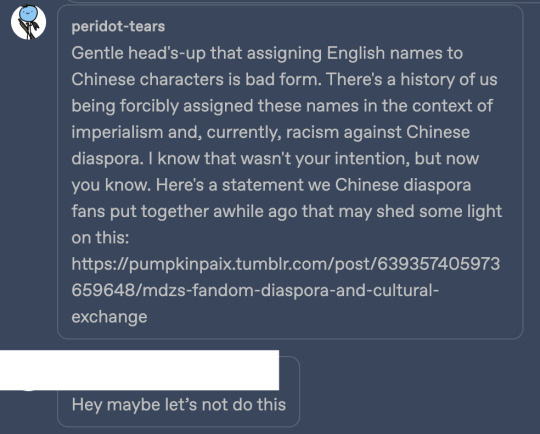
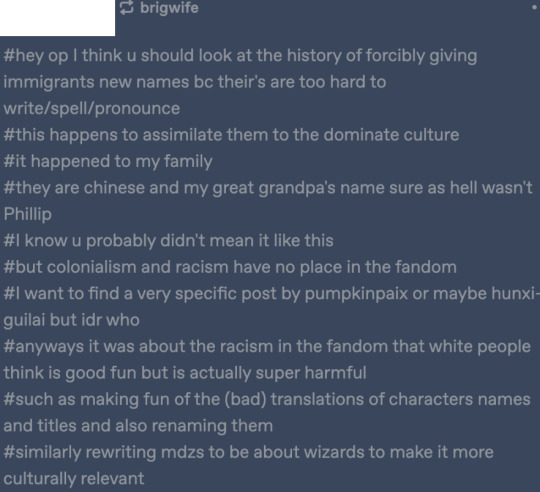
You can see that my comment assumed "good faith." However, OP deleted these comments and blocked me. (That didn't stop other people from calling it out as well, though I have to assume that if OP was so offended by my comment, the next few people will receive the same treatment.)
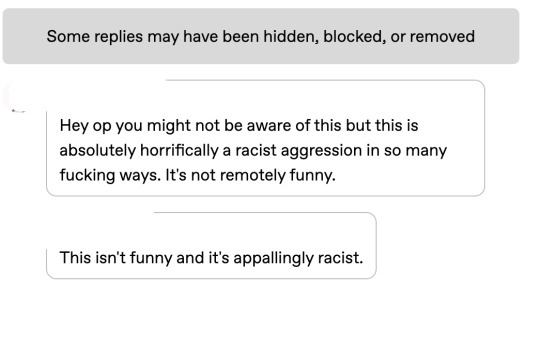
I honestly didn't like whipping up the diaspora statement -- that I wrote with multiple Chinese diaspora fans of MDZS, all of us hailing from multiple different countries and backgrounds, our ancestry coming from completely different regions of China -- because it meant that we were encountering another microaggression.
If you ever wonder why MDZS and danmei fandoms in general seem to be so bereft of Chinese diaspora voices, that's absolutely because of these microaggressions: Someone makes a joke, writes a story, writes some meta, that is culturally ignorant at best, offensive and harmful at worst, and when we gently correct them, explaining why it's racist, the person in question shuts us down, dismisses us, gets defensive, or worse.
Regardless of where you are -- fandom, social media, on the street, at work, at school -- as long as you are interacting with other people, your words matter and affect other people. That includes being racially offensive, even if you didn't intend to be. It's how you respond to the people you've insulted that reveals your character, how willing you are to be complicit in their mistreatment.
My rule of thumb has always been this -- if multiple people, including those of the culture you've just made a microaggressive joke about, find it unfunny, racist, or harmful, then you listen. Dismiss or ignore them, then yes -- you absolutely are racist.
#fandom racism#mdzs#mo dao zu shi#danmei#mxtx#wwx#mo xiang tong xiu#墨香铜臭#魔道祖师#魏无羡#耽美#asian drama#anti asian racism#chinese diaspora#tears falling like peridots#brigwife#cultural erasure#cql#chen qing ling#the untamed#陈情令
2K notes
·
View notes
Text
MXTX Diaspora May is back for 2024!
MXTX Diaspora May is an event in which Chinese diaspora creators come together to share the diverse aspects of Chinese culture, as well as connect with each other over lived experiences.
Through the promotion and creation of these fanworks, we hope to encourage thoughtful self-reflection throughout the broader fandom, especially with regard to embracing cultural humility and dismantling structures and behaviors that allow racism to flourish, both in fandom and in real life.
Support of MXTX Diaspora May will go a long way towards creating a more inclusive and open climate in our shared online spaces, especially for creators who rarely get their voices heard in the English-speaking side of fandom. We aim to uplift the unique voices and stories of our participants, and we encourage anyone who enjoys works from this event to share in the celebration of Chinese culture from Chinese creators.
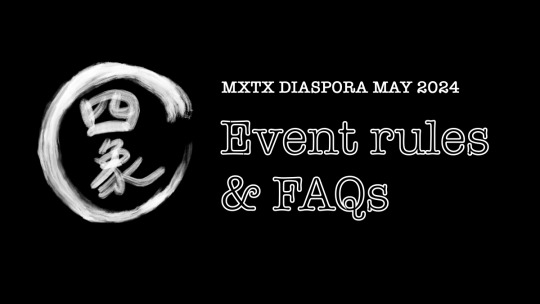
Any creator with Chinese heritage may participate in MXTX Diaspora May. Event rules and work requirements may be found at the link below.
Please note one major change from last year: all works must be complete at the time of posting. We will not accept works-in-progress into our collection.
Event Rules & FAQ

Our prompts this year are based on 四象, the Four Symbols, also known as the Four Guardians, Four Gods, or Four Auspicious Beasts. You can find an overview of the Four Symbols on wiki.
Sub-prompts for the event will be posted soon.
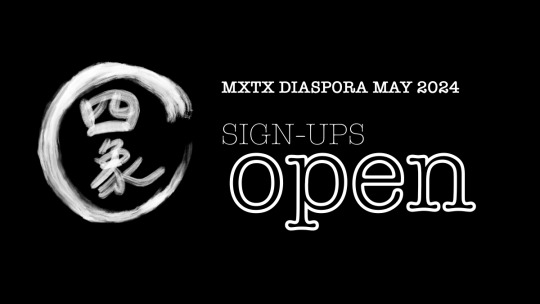
Are you a creator of Chinese heritage who's ready to sign up for this event? Please fill out the sign-up form below!
You will receive a discord link to the event server after you complete the form. Please make sure to join the discord server to connect with fellow event participants and receive event announcements and updates.
Sign-ups will run from March 17, 2024 to April 9, 2024.
Sign-Up Form
Signal Boost!
Reblogs and signal boosts for this event are welcome from both participants and non-participants. Please feel free to boost on bluesky and twitter as well.
Feel free to check out our collections from previous years. Comments and kudos are always appreciated by creators!
2021 (MDZS only)
2022
2023
We look forward to sharing and celebrating everyone's works from the 2024 event!
#mxtx diaspora may#chinese diaspora#sino diaspora#mdzs#tgcf#svsss#mo dao zu shi#tian guan ci fu#heaven official's blessing#the grandmaster of demonic cultivation#the untamed#cql#chen qing ling#ren zha fanpai zijiu xitong#魔道祖师#天官赐福#人渣反派自救系统#墨香铜臭#mxtx event#mxtx#mdzs event#tgcf event#svsss event#fandom event#fanfic#podfic#fanart#chinese diaspora event#scum villain's self saving system
167 notes
·
View notes
Text
Gentle reminder — if you are someone who reads cultural meta written by Chinese fans on your fave danmei novels, please remember our culture isn’t a monolith. Some of us have differing interpretations of the text. This is all relative to upbringing, lived experience/exposure, knowledge, research, personality etc. Another Chinese fan might see themes and markers in a different way I do, and that’s okay.
What’s not okay is to pit one person’s meta against another’s, especially if you are not part of the culture. Like “so-and-so said this, and it explains very well why what you wrote is wrong”. Or worse “so-and-so said this and it contradicts yours, but i think they’re right because they are 2nd gen/have grown up on the mainland whereas you are 4th gen/grown up diaspora”.
Please don’t do this. We all have different reasons for writing cultural meta. Some of us do it out of love for the text, some out of love for the community, and some just to get our thoughts out and help us connect with/better understand our heritage in our own ways. This isn’t an academic setting. There is no dissertation defence.
It’s legit disturbing that so many non-cn fans view cultural meta as a commodity to be critiqued or compared, or to be sharpened into weapons for bashing others.
#crossposted from twitter as im temporarily locked there#chinese diaspora#chinese diaspora thoughts#cultural meta#a meta post about meta?
212 notes
·
View notes
Text
Chinese Folk Religion: Snowy edition
Recent snow storms where I live has got me thinking: is there a deity responsible for snowfall and winter in traditional Chinese religion?
You got Frau Perchta/Holle in Germanic folklore, Yuki-Ona in Japanese Shinto folk beliefs, Skadi in Norse Paganism, and Morana in Slavic mythology, but I haven't ever heard of such a figure from my elders growing up.
So for this one, I had to actually use my limited Mandarin skills to do research, along with some help from more fluent family members and friends.
It turns out there are more than one traditional winter & snow deities in Chinese folklore. The reason I personally didn't hear of any is because, again, Chinese folk religion is extremely regional. There are central major deities that are uniform but the rest all differs from region to region. Han Chinese people have always spread out across several climate zones, from tropical to sub-arctic. Understandably, Gods and Goddesses associated with weather will differ from region to region. My Chinese side of the family hailed from a region where snowfall isn't very common, and winter isn't normally extreme. But look towards regions north of the Yellow River, and it's more upstream valleys in the Han Chinese heartland, it's a different story.
Teng'Liu: The Spirit of Snow and Frost
The first deity I can find is a figure named Teng'Liu (藤六). This is a male deity associated with snow itself. The "Liu" part if his name is the Chinese character for 6. Snowflakes typically have six arms/branches regardless of pattern. In Chinese numerology, the number 6 is also a number with "extreme Yin energy" (极阴). Snow itself is a thing with a lot of Yin energy too, as it's formed from water. Those familiar with Chinese cosmology should be familiar with the element's association with the cardinal direction of North. Which, again, is attributed with Yin. Thus explains why many forms of his folk names contains the number 6.
There is a folk ritual (which thankfully hasn't been practiced in over a century), which in Northern villages they used to offer up a young girl to this snow deity as a gift to appease him. The unfortunate girl would be tied up in a sack and left to the elements in the cold.
Teng'Liu occurs often in poetic works of literature as a stand-in for "snow". A fitting example is a work from Song dynasty writer and poet Yang Wanli, where he mentions "The Azure Lady pulls along Teng'Liu, as the Sun wilts away as she shakes (him)"** The meaning is obvious, but he mentions an Azure Lady, which takes us to another deity.
Qing'nu (青女): The Azure Lady
The second deity associated with snow and winter is a Goddess called Qing'nu, or "The Azure Lady", "The Lady in Turquoise", "The Lady in Blue", depending on the translation. She seems to be much more well-attested in ancient religious texts in addition to poetry and seems to predate the emergence of Teng'liu.
Attested in Huainanzi, a text compiled around 139 BC, "...three moons into autumn, Qing'nu emerges (from her home), and makes frost and snow fall..."
She is also mentioned as having white hair in a lot of classical Chinese poetry.
In traditional Chinese folk beliefs, Qing'nu resides in the moon and is a companion/handmaiden of the Moon Goddess Chang'E (嫦娥). Every year at the end of autumn, she will emerge from the moon palace to perform her duty: to bring winter, frost, cold, and snow. She will descend upon Mount Qing'yao (青要山), where she will bathe in the waters there to purify herself. She will then start playing her seven-stranded lyre and snow and frost will fall upon the earth to cleanse the land of impurities and diseases (until they come back next summer).
BTW Mt. Qing'yao is an actual mountain in Henan Province. The mountain itself does play a rather big role in traditional beliefs and in Taoism. In fact, there is a hill adjacent to the mountain named Qing'nu's Peak (青女峰), where on the peak there stands a pillar-like rock. In local folklore they say that lone pillar looks like a slender lady, standing atop the mountains looking down upon the earth. It marks where the Goddess herself stands every year to bring winter. The locals call it "the maiden's rock" (闺女石).
Legend has it there was once a gorgeous palace at the foot of this mountain where Qing'nu would stay in temporarily during winter. This could possibly be a reference to some type of structure used as a shrine or temple. Today only the spring that flowed in the palace remain. The very spring that, according to folklore, that the Goddess herself bathes in to purify herself. Today, young ladies from around would make pilgrimage to that spring to welcome her arrival on 14th day of the ninth month. A second pilgrimage would also be made on 13th day of the third month as she is supposed to leave and return to the moon. (the dates are the dates in the Chinese lunar calendar).
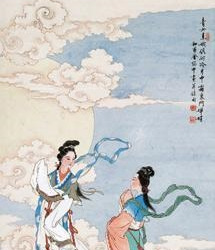
From these we can see while those deities are all associated with snow, they are seen by the people as very different. Teng'liu is very embodiment of the weather phenomenon, kind of like Jack Frost in American folklore. The fact there were rituals to appease him means that he is seen as a very unpredictable and volatile force. A spirit which has to be controlled under strict orders from a higher Celestial deity (天神): Qing'nu. Think of her as the Chinese counterpart to Frau Holle, a spirit attributed to making snow fall but not the snow itself. Or rather, think of those two like Helios and Apollo in Greco-Roman mythology. One being the sun itself and the latter being the one who pulls the sun across the sky.
This was fun, i hope all you folks who are trying to connect to their ancestral beliefs found this useful.
**translation might be off, sorry. Middle Chinese is difficult even for fluent speaker who studies old literature, plus this was Middle Chinese in it's poetic form.
#chinese folk religion#folklore#chinese folklore#history#ancestors#witchblr#witches of color#han chinese#chinese diaspora#folk taoism#chinese mythology#chinese religion#folk religion#polytheism#world religions
52 notes
·
View notes
Text
for modern AU fics - what chinese media did diaspora consume?
making this post because some of us in the diaspora server were having a chat about what Chinese media "Diaspora Chinese" watched in the 90's - 2000's (and even sooner than that) while not having access to satellite chinese media or streaming services - this is in the context of writing modern AU fics based off Chinese media/novels (so your main character's grandpa or uncle is not, in fact, watching an episode of Friends or Shortland Street or something as flavour text because sorry what the hell-)
We generally watched a lot of stuff on VCDs, including bootlegged and non-bootlegged movies, shows, anime/donghua. My household had a whole VCD album of this, and a lot of VCDs (even if they were pirated editions) would have a fancy hardcover box with a magnetic clasp and some artwork representing the show on it.
All of this is Mandarin - so not TVB stuff, because I'm from Northern China and I don't know any cantonese - but Canto friends, please feel free to add to the list! This is mostly stuff my parents liked to watch, or I liked to watch with them, with the exception of a few which I mainly watched with friends/cousins when I was maybe (in most cases) eleven/twelve years old onwards. This is a pretty personal list, meant to give people general idea of a possible "ballpark" of sorts, and by no means exhaustive.
Now, for the list of shows which I can confirm I had or someone I know had on VCD or some kind of offline media format lol (I'll try add release year stamps and links to the EN wikipedia where possible):
Period dramas (mostly Qing Dynasty stuff):
Huan Zhu Gege 还珠格格 (1998, April-) This is a classic, so many memes come from this show; hugely popular series, basically cemented Zhang Tie Lin's face as the face of the Qing Emperor for about a decade.
Tie Chi Tong Ya Ji Xiao Lan 铁齿铜牙纪晓岚 (2002-2010) - I loved this show as a kid and watched all four seasons on repeat with family... The "trio" in this show are well known and loved.
Amazing Detective Di Ren Jie / 神探狄仁杰 (2004) A very popular and addictive show.
Ok now the Big Four:
Romance of 3 kingdoms 1994 / 三国演义 (1994) - a classic that has had many remakes, my older cousin would play this on repeat...
Hong Lou Meng/红楼梦 (1987) - another classic with many remakes, but I think the most recognised by the public one is the 1987 one.
Journey to the West / 西游记 live action (1986) - I think the 1986 version of the live action is the most recognised one.
*Shui Hu Zhuan / 水浒传 (1998) - I am not too familliar with the live action of this one in my household tbh bc my mum doesn't like it lol (she keeps saying it's too depressing) but I'm sure it's up there with the rest of the big four, if anyone has an opinion on this one please let me know!
Modern setting shows:
My dad loved all the Sun Honglei (孙红雷 - actor name) stuff, iirc it was a lot of MinGuo period espionage stuff, your shanghai 1920's sxc aesthetic. This actor has been around since 1999? Qian Fu (潜伏)was very famous, and Ren Jian Zheng Dao Shi Cang Sang (人间正道是沧桑)。 These were around '08 and '09.
Chuang Guan Dong - 闯关东 (2008) (Baidu link, sorry - couldn't get an EN wikipedia one). This show was huge when it was airing, everyone was watching it. I was pretty young but even I watched it and got invested ... and I thought it was such an "old person" show at the time lmao.
Xiao Bing Zhang Ga / 小兵张嘎 (2004) (sorry, again Baidu link) - yo, anti-japanese war movies set between 1937-1945 were crazy popular - this is one of them and was very popular):
Donghua/Anime (all the stuff kid me watched and some which I didn't but were popular):
喜羊羊与灰太狼 (2005-)
Calabash Brothers / 葫芦兄弟 (1986-1987)
Black Cat Detective / Hei Mao Jing Zhang 黑猫警长 (1984-2010)
Lan Mao Tao Qi 3000 Wen 蓝蓝猫淘气3000问 AKA 蓝猫 (blue cat) (October 1999 - Present)
Legend of Ne Zha 哪吒传奇 (2003)
Journey to the West/Xi You Ji 西游记 This was truly the Donghua I grew up on from when I was a bb, the OP song and ED song are classic bangers all kids know.
Slam Dunk/ 灌篮高手 - People truly watched a lot of anime that may or may not have been terribly dubbed into mando (possibly canto too). Late 80s and 90s kids were all over this, and Dragon Ball, Crayon Shinchan (labixiaoxin).
Taiwanese Dramas:
This is mid-late 2000's, I would be remiss to not talk about the Taiwanese dramas of this era. Mike He, Rainie Yang, Wu Zun (amongst many, many others) were huge. Stuff like Dou Niu Yao Bu Yao, it started with a kiss, Hua Yang Shao Nv (Taiwanese version of Hana Kimi) were all pretty popular. Not sure if these shows all hold up in 2023, but boy were they popular at the time.
Note about CNY:
For CNY, people would try to tune into 春节联欢晚会 (the CCTV official CNY show) at that One Friend Who Had China Satellite TV's house. Zhao Ben Shan / 赵本山 was a comedy staple, and the show would often feature people from the music industry to perform. Eventually these people became more and more relevant to my gen and Jay Chou etc started appearing.
Last but not least Xian Jiaaaan 仙剑:
In 2005 I was all over 仙剑奇侠传 (Chinese Paladin), based off the video game. This show was crazy popular and probably sent me and a whole lot of other kids into Xianxia / Wuxia hell (and Hu Ge hell, and later I came back to love Liu Yifei). Thank you. The OST is a true banger.
#cnovel#mdzs#cdrama#chinese diaspora#danmei#not a lot of jinyong wuxia shows here so people who have opinions please chime in!#whew that was more than i thought#music could do with another post#but i dont know too much about my dads music i was just a 2000s cpop nerd#also this doesnt cover movies either#please no lan qiren watching friends#this breaks me out of my immersion immediately unless there was a specific reason why shufu is watching friends#not even sure how to tag this#late 2000s you could pretty much stream and download stuff i think i did that for bbjx when it came out#even tho my parents hated The Internet i managed#feel free to add more to this in a post or tags or whatever
144 notes
·
View notes
Text
Alright, happy Monday! As previously promised during my review of A Tale of Thousand Stars: in preparation for the eventual release of Moonlight Chicken, I would love to share in a long manifesto my love, my passion, the GOSPEL, for what I think may be the unsung hero and character of that show, without even seeing an episode -- the actual dish of Hainanese chicken rice itself, which is known as khao man gai in Thailand.
(LONG POST! TL;DR: this post is going to contain��a quick explanation of why it is SO BOMB that there’s a THAI BL that focuses ON THIS DISH, a description of the dish itself, a diasporic history of Hainanese chicken rice, links to a few recipes, and a list of places where I’ve had Hainanese chicken rice in the States.)
Borrowing a photo from Mark Wiens! Let’s get started.
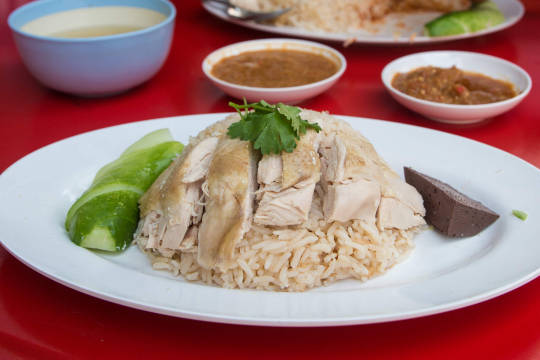
Girl, why exactly are you going off on all this?
Why, oh why, you may ask -- why should Mama Turtles wax POETIC about the seemingly simple dish of chicken rice? The simple name of the dish belies a deeply cultural symbol of so much -- of the roles that particular dishes play in Southeast Asian cultures, of how such a dish can be so difficult to make AND to relate to, and at least most importantly to me, how immigration and diasporas created the complicated and diverse foodways and cultural fabrics that we see in this part of the world.
(For the record, I’m part Malaysian, and have spent significant time of my adult life in Malaysia and Singapore. While these areas are not Thailand specifically, there’s tons of shared food preparation, culture, and appreciation from Thailand, down south to Penang and the Malay Peninsula, and down to Singapore.)
Why is khao man gai such a big deal vis à vis Moonlight Chicken?
Before I talk about the details of the dish itself, I want to set the context of why is it SO MOTHERBLEEPING LOVELY that there’s a Thai BL (with our DARLING Earth and Mix starring in it, with the DARLING First and Khao in supporting roles) that is ostensibly centered on a man making khao man gai. This is deeply heart-warming, soul-settling, feel-good shiz to me, and I think that a lot of Thai BL fujoshis who are obsessed with food, like me, would feel the same way.
Hainanese chicken rice/khao man gai is made of the most humble of ingredients -- chicken, rice, water, salt.
The fact that there would be a queer series centered around a queer man making khao man gai and selling it to others -- it means that a dish that is totally, utterly accessible to EVERY SINGLE PERSON in a country is being centered in a show focused on queer relationships....the kinds of relationships that should also be accessible to EVERY SINGLE PERSON who wants this kind of a relationship in an Asian country.
This will make even more sense as I continue writing about the dish, but suffice to say, while it’s complicated to make, Hainanese chicken rice is about the most egalitarian food there is -- and the freedom to love whoever you want should also be as egalitarian as that.
What is Hainanese chicken rice/khao man gai, and what is the big bleeping deal about it?
Before I jump to Wikipedia, maybe I should have Earth himself explain the dish.
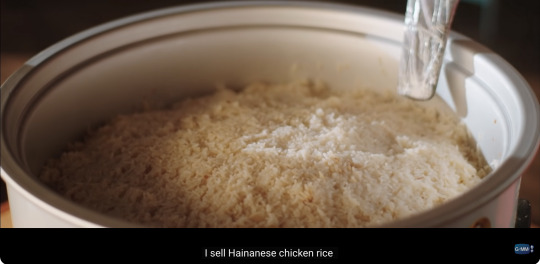
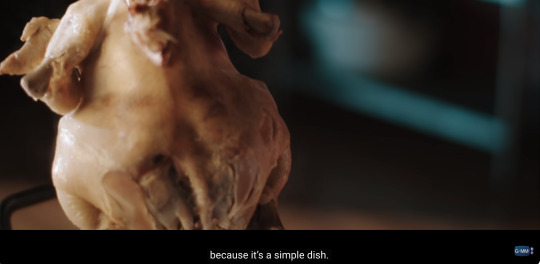

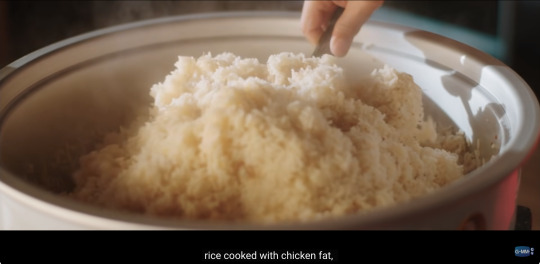
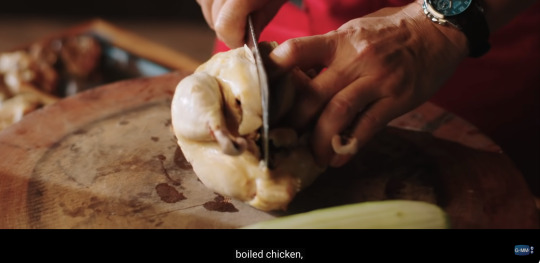
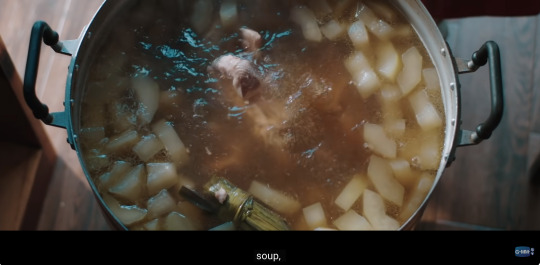
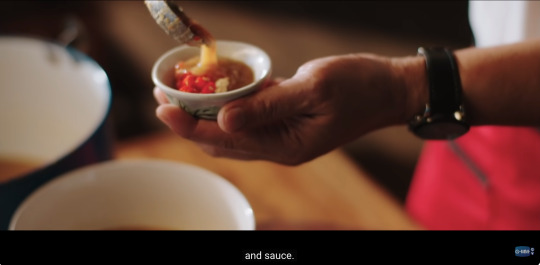

That last screenshot is truth.
Obviously, the easiest place to find a background on this dish is Wikipedia, and what I actually didn’t know before starting to type this up is that khao man gai literally means “chicken oily rice,” which totally sums up this dish. While it seems simple, it’s a very rich and filling dish, but also healthy-ish, because you’re still eating chicken, which is not the richest or fattiest of meats.
The dish consists of rice that’s first been sautéed with aromatics like ginger and garlic, and (in many, but not all cases) also sautéed with rendered chicken fat. (If you’re from the East Coast of the States or are part of a Jewish community, you’ll know this ingredient as schmaltz.)
That fatty sautéed rice is then steamed in chicken broth, ideally in chicken broth that you yourself made while you were boiling the chicken that you’ll use in your khao man gai. As far as that chicken goes, you’ve cleaned it, prepped it, maybe you rubbed salt on it to get rid of any impurities on the skin, and boiled it until it’s cooked, but not overcooked. If you’re in Thailand, you might just let it cool; if you’re in Malaysia or Singapore, or elsewhere in Asia, you might give that baby a dip in ice water after it’s done cooking, to tighten up the skin and give the skin a jellied texture that is beloved by many. You also might rub some sesame oil on your chicken after the boiling process, which is done in some, but not all, places.
You also might go wild and serve your rice not just with the boiled chicken, but also with roasted chicken, or fried chicken, or a combo of boiled/roasted/fried chicken. You ALSO might WILD OUT MORE and ALSO serve your chicken rice with, say, crispy siu yuk, which I’ve had, and like.... ooooommmmfffffgggg. It sends shivers down my spine, it’s so good.
You’ve also made the broth perfectly with aromatics, and possibly simmered either daikon or winter melon in the broth to serve alongside the composed dish of chicken and rice.
AND, you definitely best have made some side sauces. Garlic-ginger-vinegar sauce, maybe, or ginger-scallion oil, or red chili sauce, or all of them. In Thailand, a sauce that features taucu, or fermented yellow soybeans, seems to be an absolute must -- and it is goddamn pure heaven to put on your khao man gai. If you’re in Malaysia, a small dish of vinegared chili, known as chili padi, is a must must. Depending on where you’re eating this in Asia, you’ll put a bottle of dark soy sauce on the table for drizzling over all your rice, but -- you might not always see that at every place where you’re eating chicken rice.
In OTHER WORDS: this dish is a bit of a beast to make. The simple LOOK of the dish -- white chicken on top of white rice, with some sliced cucumbers to the side, and a bowl of broth next to it -- is totally disingenuous to the work you need to put in to make it taste great. Your broth, for instance, might be made by boiling chicken after chicken after chicken in it. That broth gets more concentrated and powerful over time as you’re putting in more and more aromatics in it. Your store is defined by your broth; by how perfectly each grain of rice is individually coated in a sheen of chicken fat, salt, and other seasonings; by your one-of-a-kind sauces that hit and accompany the chicken and the rice perfectly, and most importantly, by how all these components come together. If your soup, chicken, rice, and sauces are ALL PERFECTLY MADE, then you’ve hit paydirt, my friends.
It’s VERY RARE to find a shop that does all these components perfectly, or at least at the same level of tastiness.
Alright, so I get that this dish can be a motherfucker to make. But why is it such a big deal, culturally? Why would a Thai BL be focused on a guy making this dish?
So for this part, I first want to say that I think it’s very important for a Western audience to understand that this dish is deeply loved in MANY countries in Asia and Southeast Asia. I’ve eaten this dish with groups of Westerners in SE Asia -- actually exclusively white folks, now that I think about it -- and to a tee, I’ve heard complaints by them that this dish is boring and they can’t see what the big deal is about it.
I mean, American pork chops can be fine, or they can be boring, too.
The fact that chicken rice spans multiple countries and foodways should tell a Western audience that there are qualities about it, as I listed above, that are far beyond the sum of its parts. For instance -- the way to get each GRAIN of rice coated in fat and flavor takes years of experience. Y’all, I still can’t get perfect rice in my rice cooker, and I’ve been making rice for my family for more than 10 years. These things take time to perfect, and not everything one eats in Asia is going to be bombastic, like, say, Taiwanese stinky tofu or a gorgeous omakase at a high-end sushi bar.
Part of the reason why this dish is so beloved is because it IS very ubiquitous from the China-to-Southeast-Asia diaspora. I can mostly speak for Malaysia (I apologize for not knowing more about immigration patterns in Thailand), but MUCH of the fabric of Malaysian cuisine comes from specifically regional immigrant diasporas, namely from the area of China that is now known as Fujian, but that’s not a hard and fast historical rule. Well-known populations from this area in China that settled in Malaysia include the Hakka and Hokkien populations (you may have seen Hakka mee or Hokkien mee on Malaysian restaurant menus), and they also include the Hainanese population, which brought a style of boiling chicken in broth to the areas where the population settled -- which include Thailand and Malaysia, and eventually Singapore, as Hainanese descendants moved farther south down the Malay peninsula.
(By the way, if you’re ever curious, you need to read up on populations that were literally created after the first waves of Chinese immigration to Southeast Asia. The well-known Peranakan population in Malaysia, for instance, was literally created through interracial marriage of Chinese immigrants to native Malay populations, and a deeply important culture, including foodways, were born out of those marriages and population growth. It’s fascinating history in a world that often seems so hyperfocused on far right movements wanting “racial purity.” What cultural beauty comes out of populations and diasporas meeting each other and creating new cultures together.)
Back to the discussion: as Malaysian cultures and populations developed over time due in part to the influence of Chinese immigration through Southeast Asia, so, we assume, the same was happening in Thailand. (We can see deeply the effect of the influence of Chinese culture in a show like Big Dragon, which was centered around the telling of Chinese Buddhist myths through a Thai lens.) And as these immigrant populations from China traversed the Thai-Malay peninsula, their food habits stuck and were adopted by the native Southeast Asian populations. It’s no wonder that chicken rice became as beloved and ubiquitous as it did -- in part because rice is a staple food across the whole region, in part because it’s such a comforting dish (like congee, like juk, like okayu porridge), and in part because the individual ingredients themselves are humble and easy to find for your everyday home cook.
I want to just quickly touch upon the point of rice as a staple food. It seems so super obvious to us Asians, but especially for fans of QL that may not be Asian and/or may not have rice as a central and everyday food -- to make a dish like chicken rice perfectly, to have it center on the particular way in which you PREP and COOK the rice, for the rice to be all oily and salty and chicken-y -- the dichotomy of how humble rice is with how GLORIOUSLY TASTY and filling the final result of chicken rice is, can really move you. There are thousands of other rice preparations out there that are just as beloved as chicken rice -- from the Malaysian nasi lemak (literally “fat rice,” or rice cooked in coconut milk and served with delicious accompaniments) to Indian biriyani, to Japanese takikomi gohan or tamago kake gohan, to Korean bibimbap or gyeran bap -- you get the point. Dishes that center on rice are just beloved. They just are, because rice is so fundamentally egalitarian and important to our everyday way of being and eating.
AND, the way in which you EAT chicken rice -- by mixing up the accompaniments throughout the eating process, dolling up each bite of rice with a different sauce, having a sip of soup, taking a bit of meat -- that whole process of making each bite taste different allows you to have a whirlwind experience of eating with, again, very humble ingredients that end up being far more than the sum of their rice-meat-and-veg parts.
And so. When Chinese populations were immigrating throughout Southeast Asia, they brought with them, and adapted over time, a style of making rice with chicken and fat that, again, seemed so simple, but was so full of a kind of quiet and comforting flavor, that it HAD to be adapted by every country and population in which the Chinese immigrants had settled. The love for rice in the whole region was going to lead to a guaranteed adaptation of this dish for generations to cook and enjoy.
Finally, regarding Moonlight Chicken once more -- without having seen an episode yet, I want to offer some conjecture that I think (or hope) that the plot reflects the simple-but-complicated nature of the dish of khao man gai with whatever happens in the love triangles of Earth, Mix, First, and Khao. There might very well be love parallels that what seems to be simple is actually a beast to make, both in food and in relationships.
And regarding a cultural love for rice dishes, and the fact that this dish and a khao man gai establishment is at the heart of this show: it fills me up with so much comforting happiness that a khao man gai joint is what’s being used to center a theme of where people go to kick off the show. If you know of a great khao man gai joint -- you go to it, people flock to it. The trailer shows drunk people stumbling around. If you’re drunk and hungry, you want to go to a place that gives you comfort, right? That might be a McDonald’s, a taco truck, a diner, a 24-hour Korean restaurant (ugh, anju at 2 am while you’re nursing your eventual hangover...memories).
Khao man gai IS COMFORT, and IS comfort food. Earth’s character providing that comfort...I’m just saying, there HAS to be parallels between khao man gai and the storyline of Moonlight Chicken. THERE MUST BE. Let a girl dream!
Damn, girl. You went OFF. Take some Altoids. Give us some recipes!
Yes, this is definitely a manifesto of manifestos of an amazing dish.
These recipes mark the cultural landscape of this dish. I’ll note where the recipe comes from. I encourage you to review these recipes and check out the small-and-large differences in how this dish is made, depending on where in Asia the recipe is centered. (For instance, many of these recipes call for that ice bath that I mentioned earlier; that’s not ubiquitous in Thailand.)
Also, I want to note that as far as the side soup goes, I’ve only seen that Thai preparations of khao man gai GUARANTEE the soup on the side. I’ve seen some places in Singapore offer the side soup, but not all. The addition of daikon or winter melon to the soup, in Thai preparations, gives me the shivers, it is so good. So if/when you’re making this at home, keep in mind that you can choose to serve the broth/soup on the side.
Two last notes -- this coming from me, a mom and busy home cook. I sometimes do a very bastardized version of this dish for my kids, where I poach chicken in aromatics, but I don’t sauté the rice beforehand -- I just chuck the rice in my rice cooker with my poaching liquid. When I do this, I always freeze a half-quart to a quart of broth. Then, when I make the dish again, I take out that frozen broth, add it to my pot with my new chicken and water, and start poaching again. Having that base of previous broth really DOES help make my future chicken and soups taste that much richer.
AND -- while I have daikon available in my supermarket (thank you, big cities!), I often use turnips as the veg that I serve with the broth. I LOVE turnips in soup, y’all! Turnips in chicken soup are oniony without being overwhelming, and I love how translucent and creamy they get. They totally hold the flavor of broth beautifully. Next time you’re making soup, don’t leave the turnips behind, they’re great! (Oh, and also, a tip I learned from the Kinou Nani Tabeta mangas -- I also use leeks as an aromatic in my soup, along with garlic and ginger. Leeks are AMAZING in soup! They can help take away any gaminess you might get from poaching chicken or other meat.)
Okay, recipes!
The Woks of Life (China)
Food 52 (Thailand)
Mark Wiens (Thailand)
Rasa Malaysia (Malaysia)
Adam Liaw (Singapore-ish recipe, note the use of sesame oil for rubbing on the chicken after the ice bath -- not all recipes call for this)
Kwokspots (maybe we can call this a ubiquitously Asian recipe? I actually just love this dude on IG, I’m gonna hype up his recipe)
Um, this is a lot. Where can I order this dish?
In my post about A Tale of Thousand Stars, I referenced Eim Khao Man Gai in Elmhurst, Queens, NY (see footnote below). I unfortunately only know places to eat Hainanese chicken rice/khao man gai in either NY or SoCal, but I ENCOURAGE you to please seek it out wherever you live.
Over the years, even while I’ve lived thousands of miles away from New York, Eim Khao Man Gai is my restaurant par excellence for khao man gai. It’s all they serve, and they do it SO well. Eim Khao Man Gai also does their chicken three ways -- steamed, roasted, and/or crispy. You guys, it’s just heavenly, and their side sauces are to die for.
In SoCal, Savoy Kitchen was the first place I heard of that specialized in chicken rice, and it’s incredible here. As well, I love Side Chick at the Westfield Santa Anita mall in Arcadia. I’ve eaten a bunch at Ipoh Kopitiam in Alhambra, but I haven’t tried their Singapore-style Hainan chicken rice yet -- it looks amazing, and many reviews say that it’s currently best version in the San Gabriel Valley.
Back to New York for a second -- if you’re looking for a place more local to you that isn’t in Queens, just look at Yelp. If I lived in NYC now, I would be in tears with how much more available this dish has gotten over the years.
Wherever you are in the States -- the Bay Area, Texas, anywhere where there are significant Asian populations -- or wherever you are in the world, please seek out Hainanese chicken rice/khao man gai. Again, it may not LOOK exciting on the menu. But you’ll get a taste for the kind of comfort food that really hits home for so many of us Asians.
Holy shit. You must be exhausted!
WOW WOW WOW, y’all. If you’ve gotten THIS FAR -- bless you! Thanks for going on this road with me. Please make, buy, and/or eat Hainanese chicken rice/khao man gai. Appreciate the differences of the dish from each of the cultures that you’re eating it from. Please give big hugs to GMMTV for focusing a BL on this most humble, beautiful, delicious, soul-satisfying dish. I’m hoping for all the food/love parallels. I’m dying to see Mix just snarf on a big plate of khao man gai to kick the series off.
Moonlight Chicken is gonna be SO GREAT! And chicken rice is just the best dish ever. Please enjoy it!
* * *
If you have the energy to read a little further, one more urge from your devoted food mom here. @secretsfromwholecloth noted in a comment on my ATOTS review that ae and aer friend had actually hit up Eim Khao Man Gai, which was SO RAD to read. If you have never visited NYC before, and you’re plotting your itinerary of the usual tourist stops -- I beg you to please save at least an afternoon to hop on the 7 train and head out to Queens. Queens has some of THE BEST RESTAURANTS in NYC. From Indian and Tibetan in Jackson Heights, to Thai and Filipino food in Elmhurst and Woodside, to Greek in Astoria, to Korean in Bayside and Flushing, and the monolith that is Flushing’s Chinatown -- Queens is the happiest and fucking coolest diverse place in the world. Don’t be afraid to leave Manhattan for an afternoon or even a whole day. Eat everything during the day, hit up Flushing Meadows Corona Park for some exercise, check out the Queens Museum and the awesome Noguchi Museum, unwind at a cocktail bar in Long Island City or Sunnyside at night. Queens is totally the unsung best borough in NYC, one of the most diverse counties in the States, and I’ll stand up for Queens County every minute of my life over Manhattan.
#moonlight chicken#a tale of thousand stars#earth pirapat#mix sahaphap#earthmix#khao man gai#hainanese chicken rice#cooking#thai cooking#malaysian cooking#singaporean cooking#hainan#foodways and diasporas#chinese diaspora
178 notes
·
View notes
Text
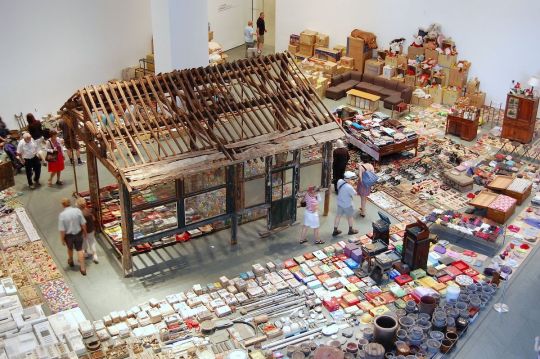
The Art of Accumulation in an Age of Decluttering
My mother came of age under British colonial rule in Hong Kong, treated as a second-class citizen and unable to return to her parents’ ancestral home in Hunan province. In the US, she roamed antique malls and flea markets in search of relics, specifically those from China that had somehow made their way overseas and were being peddled by dealers who, back in the 1990s, didn’t know their true value. Instead of magazine subscriptions, we received catalogues in the mail from Christie’s and Sotheby’s, which my mother would study in order to teach herself how to differentiate between what was authentic and what was fake. All I knew as a child was that we had a lot of old things. I didn’t understand their significance to my mother until I fully grappled with my own sense of identity. Through collecting, she keeps alive the dream of cultural belonging, the antiques serving as both connection to and substitute for the melancholic fantasy of a motherland.
From the essay I was most proud of publishing this year about hoarding, art, my immigrant mother, and Marie Kondo.
Image: Song Dong, Waste Not: Song Dong, 2006 (installation view), at the Museum of Modern Art, New York.
#my writing#hoarding#art#art writing#art criticism#personal essay#antiques#thrifting#song dong#marie kondo#ornamentalism#anne anlin cheng#chinese diaspora#immigrant#mother#momus
18 notes
·
View notes
Text
Another thing that drives me absolutely insane is the fact that three critical character moments in EEAAO (Kindness is strategic and necessary/It's okay if you don't like who I am, Ah Ba, because I do/Can you please, just, STOP?) are all in the three different languages in the film and as the child of Chinese immigrants I can't help but feel so incredibly elated that to hear this!! Like yes i hear all THREE of them and this film recognizes that!! Not just English and not just Mandarin either but English and Mandarin and Cantonese!! And it just makes my heart burst
#non sw#Eeaao#everything everywhere all at once#Everything everywhere all at once Meta#chinese diaspora#Asian American
80 notes
·
View notes
Text
People often think Chinese = only from China, but there are millions of us who've been living overseas for generations in Singapore, Malaysia, Philippines, Kazakhstan, USA etc.
Like yes, I am ethnically Chinese but no, I'm not a citizen of the People's Republic of China.
#But i do respect mainlanders!#And wish i had more of a connection to China#chinese diaspora#Personal#Philippines#Malaysia#Indonesia#Singapore#Tiktok
10 notes
·
View notes
Text
Many of our compatriots in the Mainland believe that the huaqiao [note below] are all capitalists. Even the relatives in our hometown [Tangshan] look upon the fanke [the Hokkien term denoting lamnang, "our people," who had left China to make a living in a foreign land; literally, visitors or guests in a foreign land] as landlords and feel that going abroad is the path to prosperity. They do not understand the truth about the huaqiao. Of course there are huaqiao capitalists, but they are few in number. Eighty to ninety percent of the huaqiao are laborers, and a majority of them are small-time vendors, storekeeprs, workers, and peasants. They scrimp on food and other necessities in order to save money and return home and support their families.
[Lagalag sa Nanyang (Nanyang Piaoliuji) ni Bai Ren, salin ni Joaquin Sy. Galing sa yugtong Introduksiyon ni Caroline Hau.]
Lagalag sa Nanyang (Nanyang Piaoliuji) by Bai Ren, translated by Joaquin Sy. Excerpt from the Introduction by Carioline Hau.
Note: Huaqiao for the most part of its hundred-year history connoted enforced migration or exile, with additional meanings of official protection extended to Chinese abroad as well as self-conscious patriotism among the Chinese abroad, expressed as "cultureal" commitment to remaining "Chinese" or restoring one's "Chineseness". [...] It has also been applied to settlers who are foreign subjects.
I found this interesting. It corresponds with the stories our yaya told us of her father, who was born in 1900s Southern China (which province, she doesn't know) and migrated to the Philippines around the first quarter of the 20th century, leaving behind a family. He was very poor and sold siomai and other dimsum, I believe. He couldn't marry my yaya's mother because there were laws prohibiting the marriage of Chinese people and Filipinos.
According to Caroline Hau's introduction, author Bai Ren (real name Wang Jisheng, also a poet, novelist and dramatist) was born in Fujian in 1918. He migrated to the Philippines in 1933, traveling through Visayas then Manila in Luzon. He returned to China in 1937.
5 notes
·
View notes
Note
https://www.cbc.ca/amp/1.6779785
As Ottawa launches investigations into claims China interfered in two elections, some members of the Chinese diaspora are warning about an increase in anti-Asian racism, while others say racism could be used to hinder the search for the truth.
"The first thing we need to be very sure about is that racism is not being used as a shield to deflect or distract from the real issue at hand," said Cheuk Kwan, co-chair of the Toronto Association for Democracy in China.
As anti-Asian racism has spiked as a result of the pandemic and as the Sino-Canadian relationship continues to be strained, many question the effect of the investigations on the Chinese diaspora.
Tagging: @allthecanadianpolitics
37 notes
·
View notes
Text
stories that spoke to us: MDZS & the Chinese diaspora experience
From March to April 2023, Chinese diaspora fans in the MXTX Diaspora May discord server and Danmei Diaspora discord server compiled a list of MDZS fanworks that rang true to their diaspora experiences. Works that used canon as a setting were excluded, but everything else was welcome. Most, if not all, of these stories were written and/or podficced by Chinese diaspora fans.
This is not a comprehensive list of all MDZS fic with diaspora settings, nor do the works encompass all the diverse experiences of Chinese diaspora. If you would like to contribute to the ongoing recs sheet and future fanwork compilations, please contact @dmdiaspora on twitter or tumblr. You may also send information about a fanwork rec you’d like to add.
Without further ado, we present a list of the diaspora stories that we felt represented our voices. These recommendations have been categorized by in-story identity markers and settings.
We will making recommendation posts for each individual story from now until the beginning of May.
Reblogs are welcome.
679 notes
·
View notes
Text
MXTX Diaspora May 2023 is drawing to a close, so here are some personal reflections
As some of you may know, MXTX Diaspora May was originally started by Frost in 2021 as a means of elevating Chinese diaspora creators in fandom. At the time the event was set up, the climate in fandom was truly a hostile one, with Chinese diaspora creators routinely facing discrimination and marginalization. Adding to that were a slew of vicious hate crimes against Asian diaspora people in real life.
May is AAPI Heritage month in the US, and thus it was chosen as the posting month for the event. In other words, it was a time for us to come together, to heal, and above all, to let our voices be heard.
Since 2021, the scope of MXTX Diaspora May has evolved. Instead of solely focusing on MDZS, we now spotlight fanworks for all of MXTX’s novels. More importantly, MXTX Diaspora May has gone international in welcoming the participation of Chinese diaspora creators from not just the US, but all around the world (like me)!
So, why is MXTX Diaspora May so meaningful to me?
At the time that Frost invited me to be a part of the mod team, I was honestly struggling to find a place in MDZS fandom. I was frequently spoken over, treated as an expendable resource for cultural information, and on the receiving end of comments that contained racist microaggressions (and sometimes, outright aggression). Dealing with these interactions was exhausting, as well as grappling with the constant feeling that I had no real right to be in the English-speaking fandom. I still feel like this, even today — works where I (subconsciously or otherwise) downplay my identity as a member of the Chinese diaspora are always substantially more well-received than works where I do not. In other words, as some commenters (helpfully) pointed out to me, it was exhausting and difficult to get into the stories I told and the viewpoints I presented, especially if they contained too many cultural markers and language code-switches.
Being part of MXTX Diaspora May changed everything for me. Creating and interacting in this space that belonged to us, that was built solely for the purpose of elevating voices like mine — it meant that for once, I could tell the stories I wanted to tell, to the likeminded people I wanted to reach, without needing to downplay, apologize, or make excuses for just how unpalatable they might be.
Personal revelations aside and back to the culture-building aspect — I truly believe that the path to disempowering racist structures in fandom (and by extension, in real life as well) lies in changing the fundamental mindsets and worldviews of people. And to achieve that, we all have to relearn the ways in which we think, feel, and operate. MXTX Diaspora May is built on this very principle — the belief that through giving a platform to marginalized voices and actively encouraging open dialogue and appreciation, we can connect with each other over our shared experiences and gradually influence the perception that others outside our immediate circle have over our culture and language. It is an active, inclusive, and sustainable way of dismantling preconceived notions and habits that allow racism to flourish in fandom.
At the same time, it is also worth acknowledging that there is also a limit to how much power we place in institutions to do the work for us. Sit with the discomfort and the exhaustion, question our preconceived notions, and challenge our hearts — and I am optimistic that as things change at the individual level, the associated structures and systems will naturally follow.
So, where should we start?
There are so many ways we can be a part of the movement to dismantle systemic racism against members of the Chinese diaspora in MXTX fandom. One of the most actionable ways would be to boost and consume works by Chinese diaspora creators. And if we’re reading, listening to, or looking at something that doesn’t immediately appeal to us, and especially if we find ourselves struggling to comprehend or relate — ask ourselves honestly if it is a failing on the part of the creator, or just our own unfamiliarity with the context of the work, and/or implicit biases coming into play. Take our time to realize it for what it is, and then decide from there whether to move on, or move ahead.
MXTX is a Chinese writer, and her works are an extension and reflection of her culture and upbringing. It is impossible to separate her identity and belonging from the stories she writes. It’s exactly the same for us Chinese diaspora creators. Wherever we are in the world, however we were raised, and whatever pieces of ourselves that we choose to share in our works — I hope that we will continue to find our peace, our pride, and our homecoming whenever we do.
Resources
MXTX Diaspora May collection (2023, 2022, 2021)
Danmei Diaspora Creatives collection (showcases work by Chinese diaspora creators across a myriad of danmei fandoms including MXTX; not affiliated with MXTX Diaspora May)
Directory of MDZS fics and podfics by Chinese diaspora writers that are focused on the modern diaspora experience, compiled by G (not affiliated with MXTX Diaspora May)
317 notes
·
View notes
Text
I'm not going to give a full rundown on what "face" is in Chinese culture, because I do not have the time or energy or vocabulary for it right now.
But god, the concept of "face" or "面子" or "脸" is so ingrained in Chinese culture that even miles away from my parents' homeland, I am still dealing with my 面子 and how that affected and still affects me. It's one of THE aspects of Chinese culture that I absolutely cannot stand and something I actively try to dismantle and challenge. But it's still there, flowing through me like the blood of my ancestors. I don't think this is something I can ever get rid of.
面子 has fucked me up so much in ways I am still unraveling. It catches me off guard how much of my actions are colored by this concept. I know it's a thing that has hurt me so, so much throughout my life, and its toxicity threatens to drag me down with it if I'm not careful. I wish my therapist was able to help me through all the shit 面子 has poisoned me with, but she's so woefully unequipped, having not grown up with it breathing down her neck at all times the same way it has for me. Hell, I genuinely think only someone who has grown up in that culture would know how to help someone else struggling with 面子.
Anyways. If you've been negatively impacted by 面子 you may be entitled to financial compensation.
#chinese#chinese diaspora#chinese american#面子#face#脸#chinese culture#I dont know what to tag this as#by gray#by green
13 notes
·
View notes
Text
As someone whose primary personal exposure to real Chinese people is my parents and my parents’ friends (who were all part of the same Wuhan University graduating class and who all also immigrated to the Northeastern United States and who all also work in the pharmaceutical industry as senior research scientists—meaning they’re all also STEM PhDs), and my parents’ friends’ children, it’s sometimes really hard for me to tell whether some habit, mannerism, turn of speech, philosophical perspective, etc. is a Chinese thing or a my-parents-and-their-particular-cohort-of-Chinese-expats thing
8 notes
·
View notes
Text
okay so. this song is so beautiful it hurts my heart.
not only is it gorgeous but it is also a cover! and is VERY important to the chinese diaspora around the world.
it was one of the first 'popular' songs in chinese history!
here is the wiki for the original song and a youtube vid of the most recognizable version.
i love it. SO MUCH.
youtube
#moonlight chicken#the moon represents my heart#teresa teng#chinese diaspora#backaof noppharnach#earthmix#firstkhao#geminifourth#moonlight chicken the series#Spotify#Youtube
31 notes
·
View notes